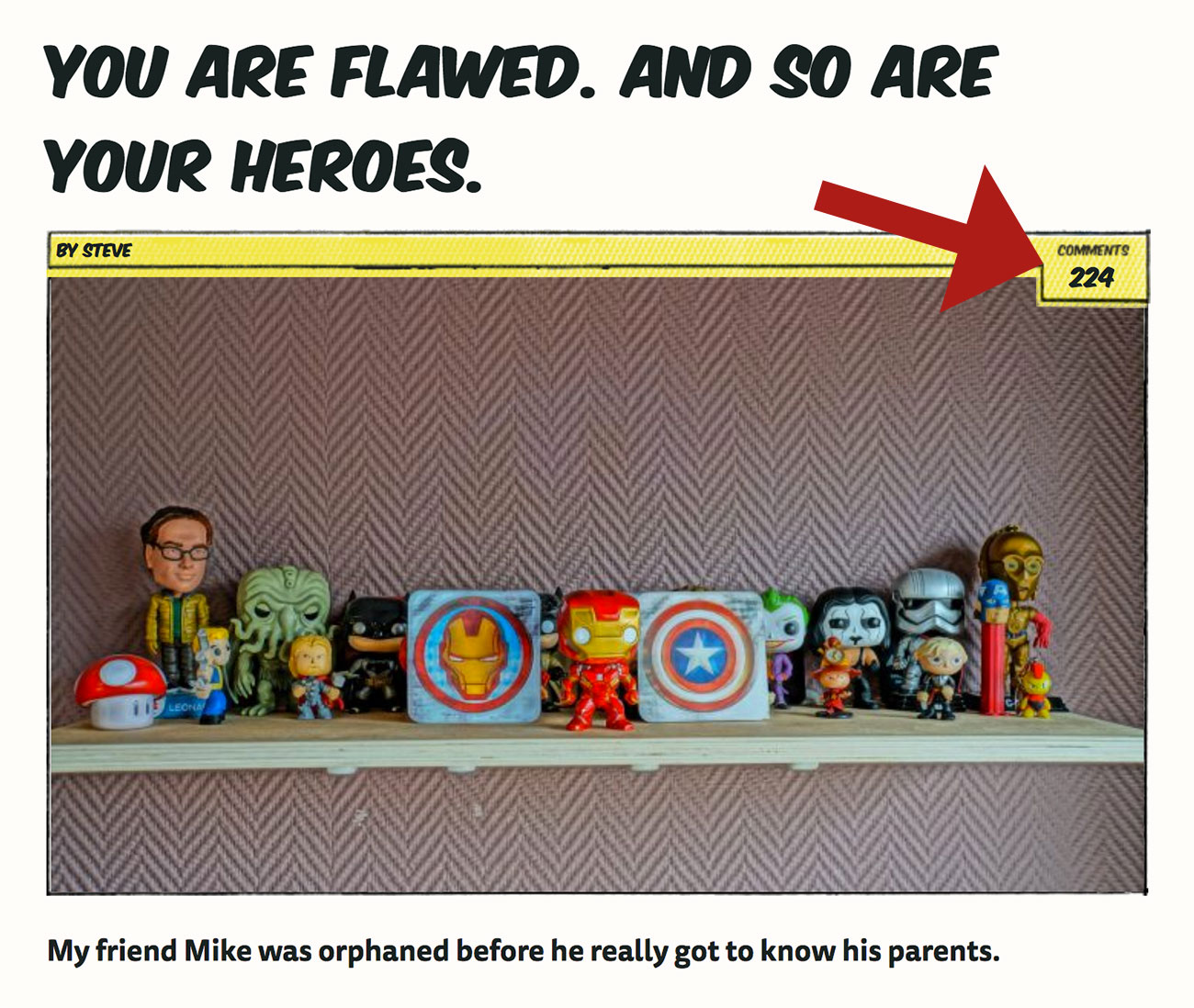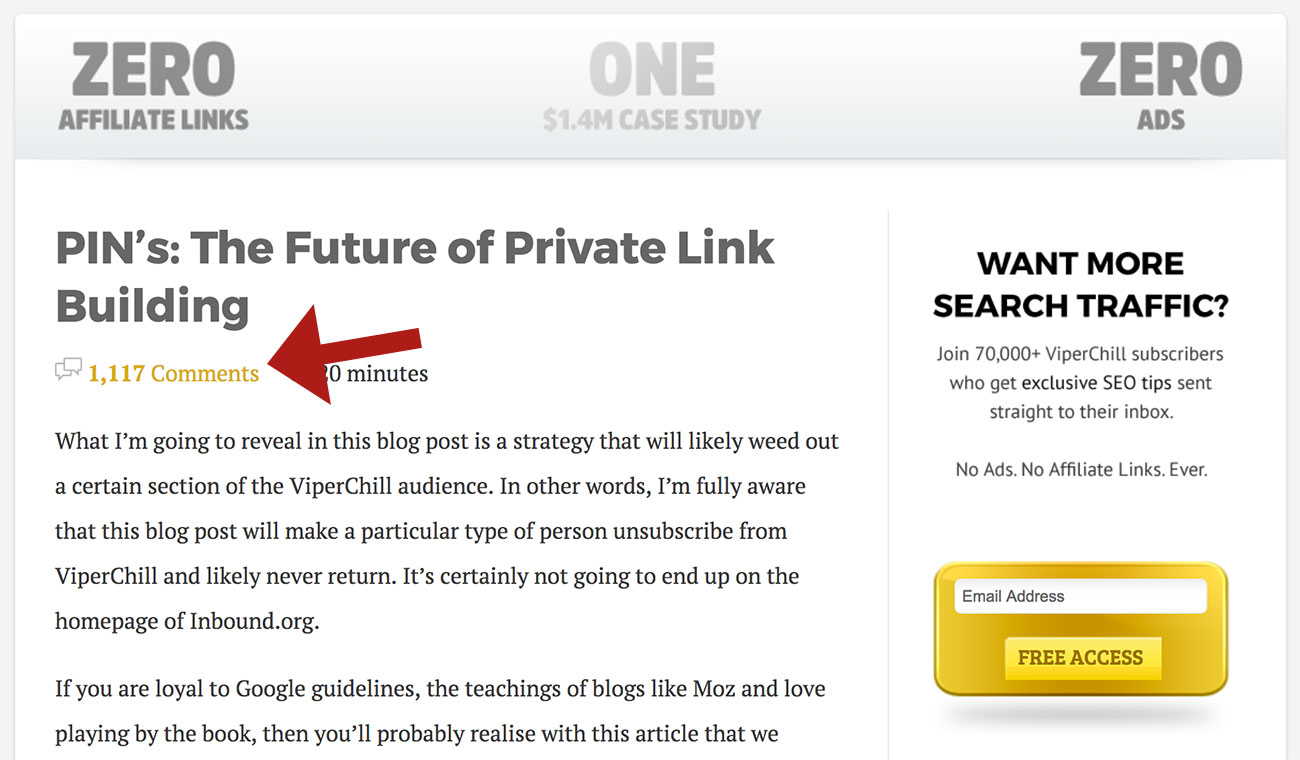
Getting more comments on your blog can be a very hard task, but there are some new strategies to try that might make things easier.
One of my favorite parts of running a blog is the friends that get made in the comments section.
The conversations that have been had on this site over the years, for example, have been a truly wonderful experience and something I’m so grateful for.
As I’ve often said – and I mean it – the comments are usually more valuable than the articles I write.
But not everyone seems to get a lot of interaction on their blog. Today we’re going to try and fix that once and for all.
Let’s take a look.
Are these basic issues discouraging comments?
Before we get into some of the strategies that can help you get more comments, we want to take a look and see whether there are any basic errors that could be getting in the way.
- Is your site mobile responsive?
If your site is (still!) not mobile responsive then there is a good chance you are making it too hard for a good portion of your visitors to interact and leave comments. Remember, upwards of 50% of your traffic could now be coming from mobile devices. - How is the load time on assets?
We know that your blog’s loading speed is important, but you also have to make sure that certain assets are also loading fast. For example, if you use a comment plugin like Disqus you need to make sure that it isn’t slow. - Are the questions answered?
Some article are so complete that there isn’t much room left for discussion. It’s worth going back to see whether your headers, content, and conclusions leave anything left to chat about. Every good blog post should be extensive but perhaps not totally solved. - Is your design too complicated?
Sometimes bloggers, in a genuine attempt to be on top of trends, add way too many things to their design which leaves less experiences web users confused about what action to take. How many options do you have available on your blog? Any more than two or three and you’ll be losing people.
Now that we’ve got some of the negative things out of the way, let’s take a look at some new things bloggers and marketers are doing to get more comments.
New strategies that lead to more comments
I should mention at the top that not all of these things are take from blogging examples but we can take lessons from each one and apply it to our own blogs.
1. Asking for mentions or tags
There is a new trend going around on social media at the moment that mixes humor an the innate power of social networking sites to get people to embarrass their friends.

The above example is a screenshot from a local football Facebook page that asks their fans to tag a mate who is losing his hair. It has over 45,000 comments…
Now, this isn’t exactly the best example to give, and a lot of these meme-based ones are sexist or stupid, but they do give a good insight into what people will respond to when asked. It’s important to note that it is totally okay to ask your readers to perform an action.

At the end of almost every blog post I like to devote a whole paragraph and closing statement to encouraging people to leave comments, and to expand on all the things that I’ve missed in the post.
In this post on starting a blog for the first time, for example, I really noticed that by asking people to comment on their own experiences or the factors that were omitted from the article that I was likely to get more comments.
2. Taking a popular event/theme and applying it to your niche
One tactic that has been working really well lately is to create marketing material out of the latest news events or themes in the world and apply them to your niche.

Steve Kamb from Nerd Fitness does this really well, and one of his latest articles called You Are Flawed. And So Are Your Superheroes. is a fantastic combination of brilliant long form content and a twist on a modern topic that every one is talking about or seeing in the movies.
One niche where we see this more and more is on late night TV where hosts like Stephen Colbert are raking in tens of thousands of comments, links, shares, etc. by commentating, night after night, on the current political climate. Just a few years ago, it would be interviews with celebrities that got the main attention, but now it is commentators like John Oliver making sense of news and politics that is getting talked about.
One way you can make the most out of this while still helping people is to create content that touches on these subjects but guides people through a difficulty. For example, if you were parent who ran a blog that talked about family, schooling, politics, etc. you could do an article about how to talk to your kids about [insert law] that Trump passed.

Another example of this can be seen on sites like The Oatmeal who go into incredible detail to study a different angle about something everyone is talking about. Their latest comic is all about how hard it is for people to change their minds and is extremely relevant for the current political climate.
It has had almost 100k shares and thousands of comments, a lot of which are really touching stories and experiences that people are sharing.
Remember, the point is not to be controversial for the sake of it, but rather to add something useful and truthful to the noise that is out there at the moment that often seems like it is trying to do the opposite.
3. Asking a popular question and making it the headline
Making headlines a question is not a new tactic, but it has definitely been getting more effective as social networking sites allow you to share that question in different formats.

Last week in the article on whether WordPress is still best we had some incredible discussions and I really learned a lot about the different options that were out there, the problems people had with WordPress, etc. All of this meant that the comment count got pretty high.
I don’t share this one to brag (the comments were often showing flaws in the post!) but rather to show you how powerful it can be to make your article about one evergreen question that lots of people have experience with. It can lead to some really wonderful conversations.
The same occurred in posts like Is Blogging Finally Dead? and Will Your Blog Ever be Profitable Enough to Support Your Family – both questions that touched a lot of people and something that was easy enough for everyone to weigh in on.

Although they don’t have a comments section, the New Yorker does this type of headline extremely well as you can see this week with Is the Gig Economy Working?. These are always in the most popular section and you regularly see them cited in other blogs and discussion threads which makes them extra valuable for building links.
Another example of this is BBC News who often post images and videos to instagram with a question over the top of the photo. This creates a lot of discussion as you can see in the post above on whether or not this is the best way to get a crying baby to go to sleep.
Making your headline/topic part of your marketing collateral on social networking sites or advertising campaigns is an extremely good way to increase organic reach because you get people discussing on and off-site.
4. Running a contest in your mail outs
Another strategy that I have found to be quite effective is to run a contest that asks people to leave a comment on a certain post in order to get entry to win some kind of giveaway.
This works especially well when you promote it to your mailing list first as they are more likely to be active in getting involved with something that takes a few more steps than usual.

As you can see in the example above, some physical businesses do extremely well by mixing a “tag a friend” promotion with a giveaway. This particular one is celebrating a cinema’s birthday with an iPhone giveaway and has over 55,000 comments so far.
It’s unclear how successful these things are – some niches will be more likely to get ongoing traction than others. This cinema, for example, probably did quite well because all of the comments would be from friends of people who already like the cinema and are in the same location.
Before running a contest, make sure you think carefully about the goals and outcomes, the prize you giveaway, and then any local laws that you need to abide by. Some countries/states have very strict things about who can run a contest and the language and prizes that can be offered.
5. Requiring a comment for a result
This is quite similar to the one above but is more like a request or registration that is a little more public or accessible as opposed to a straight email submit form.

For example, in this article Glen asked people to leave a comment if they wanted to get access to his private Facebook group as a way to protect members. It’s had over 1,000 comments and continues to grow.
I really like this idea as it creates a bit of discussion around the topic and gets people anticipating the result. It’s also a very clever way to keep the site looking alive and busy which can be very valuable social proof for new visitors who are encountering the content for the first time.
Some tricks to help with your comments
If you’re running a WordPress blog there are some really cool plugins that you can utilize to help make your comment areas more engaging and useful for both you and the readers.
- Redirect your comments
You can redirect first-time-commenters to a landing page that encourages them to sign up to your list, shows them new content, or just says thanks! - Email when someone replies
A plugin like this one will automatically notify someone by email if their comment got a reply. This is essential for encouraging good ongoing discussion. - Add extras features
A plugin like wpDiscuz allows you to add extra features like emojis, searchable comments, tagging commenters, replying directly from email, and much more. This can make the comments section feel more like a forum. - Avatars next to your comment
If you’re new to WordPress you might want to head over to Gravatar to get your globally recognized avatar next to your comments whenever you use the same email to post a message in a comment thread. - Display your most popular posts
If you have articles where ongoing comments is important then consider adding a widget somewhere on your blog that shows those most commented on articles so people know what is being talked about right now.
As always, make sure you test these things on your own blog and make a determination as to whether it is adding the right type of functionality to your blog and not detracting from important things like email sign ups or affiliate conversions.
Do you have any tricks for more comments?
I’d really love to know how your blog goes for comments. Do you find it hard to get them, or is it something that has happened quite easily for you? If you have any tips or tricks that you’d like to share please leave a message below as it might really help someone who is struggling.